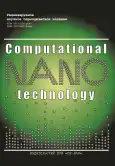Prospects for the Application of Additive Technologies in Russia from an Industry Perspective (on the Example of the Aviation Industry)
- Authors: Naim O.A.1, Ermakov D.N.1,2, Melnikov V.M.1, Kazenkov O.Y.1,2,3
-
Affiliations:
- Engineering Academy of the Peoples’ Friendship University (RUDN University)
- K.G. Razumovsky Moscow State University of Tehnologies and Management (the First Cossack University)
- Polyus Technopark of M.F. Stelmakh Research Institute Polyus JSC
- Issue: Vol 9, No 2 (2022)
- Pages: 56-66
- Section: Articles
- URL: https://bakhtiniada.ru/2313-223X/article/view/147135
- DOI: https://doi.org/10.33693/2313-223X-2022-9-2-56-66
- ID: 147135
Cite item
Abstract
Full Text
##article.viewOnOriginalSite##About the authors
Obeid Ahmed Mohamed Naim
Engineering Academy of the Peoples’ Friendship University (RUDN University)
Email: 1042218171@rudn.university
postgraduate student Moscow, Russian Federation
Dmitrii N. Ermakov
Engineering Academy of the Peoples’ Friendship University (RUDN University); K.G. Razumovsky Moscow State University of Tehnologies and Management (the First Cossack University)
Email: ermakov-dn@rudn.ru
Dr. Sci. (Polit.), Dr. Sci. (Econ.), Cand. Sci. (Hist.), Professor, Master of Engineering; Professor at the Department of Innovation Management in Industries; chief researcher at the Department for Research Activities Moscow, Russian Federation
Vitaly M. Melnikov
Engineering Academy of the Peoples’ Friendship University (RUDN University)
Email: vitalymelnikov45@yandex.ru
Dr. Sci. (Eng.), Professor, Honored Worker of Science and Education of the USSR; Academician at the Russian Academy of Cosmonautics named after K.E. Tsiolkovsky (RACC) and the International Academy of Informatization; Professor at the Department of Mechanics and Control Processes Moscow, Russian Federation
Oleg Yu. Kazenkov
Engineering Academy of the Peoples’ Friendship University (RUDN University); K.G. Razumovsky Moscow State University of Tehnologies and Management (the First Cossack University); Polyus Technopark of M.F. Stelmakh Research Institute Polyus JSC
Email: o.kazenkov@gmail.com
Honorary Worker of the Sphere of Education of the Russian Federation; assistant at the Department of Nanotechnology and Microsystem Technology; researcher at the Department for Research Activities; deputy Head of the Polyus Technopark Moscow, Russian Federation
References
- Additive technologies in the aviation industry. Moscow: Rusatom - Additive Technologies LLC, an industry integrator of the Rosatom State Corporation. URL: https://helirussia.ru/wp-content/uploads/2020/09/1.Prezentatsiya-Helirussia-2020-Rosatom
- Analysis of the aircraft industry in Russia in 2015-2019, forecast for 2020-2024. URL: https://businesstat.ru/images/demo/aircraft_industry_russia_demo_businesstat
- Barsky R. How much does a new passenger plane cost? Science and Technology. (In Rus.) URL: https://naukatehnika.com/skolko-stoit-novyj-passazhirskij-samolet.html
- Bronzova A.V., Nemova D.V. Efficiency of enclosing structures created by the additive method. ISI Science Week. Materials of the All-Russian conference in 3 parts. Civil Engineering Institute of Peter the Great St. Petersburg Polytechnic University. St. Petersburg, 2021. Pp. 126-128. (In Rus.)
- Kubanova A.N. Materials of JSC “Polema” for industrial use in additive manufacturing. URL: https://aviatp.ru/files/aviaevents-2019/MAKS/Polema.pdf
- Morgunov Yu.A., Saushkin B.P. Technical and economic aspects of additive shaping. High-tech Technologies in Mechanical Engineering. 2016. No. 7. (In Rus.)
- The main trends of the Russian market of metal powders for additive technologies. Additive Technologies. 2022. No. 1. (In Rus.) URL: https://additiv-tech.ru/publications/osnovnye-tendencii-rossiyskogo-rynka-metallicheskih-poroshkov-dlya-additivnyh
- Sirotkin O.S. The current state and prospects of development of additive technologies. Aviation Industry. 2015. No. 2. Pp. 22-25. (In Rus.)
- Current prices for civil aircraft. URL: https://aeronautica.online/prices/current-aircraft-prices-mba-2017
- Khaimovich A.I., Petrova P.S., Kokareva V.V., Smelov V.G. Improving the efficiency of operational planning of distribution of orders of additive manufacturing. Bulletin of the International Market Institute. 2020. No. 2. Pp. 137-143. (In Rus.)
- D’Aveni R. The 3D-printing revolution // Harvard Business Review. 2015. No. 93 (5). Pp. 40-48.
- Essentium’s latest survey: What is the future of industrial 3D printing? URL: https://www.3dnatives.com/en/essentium-190320195
- Kuhn T. Druck dir deine Welt // Wirtschafts Woche. 2011. No. 51. Pp. 72-78.
- Schiffler R. Revolution auf leisen Sohlen // VDI nachrichten. 2015. No. 43. P. 2.
- https://www.airbus.com/en/newsroom/news/2016-06-airbus-tests-high-tech-concepts-with-an-innovative-3d-printed-mini-aircraft
Supplementary files








